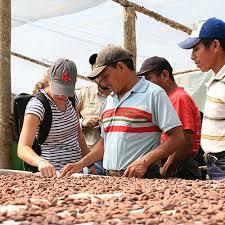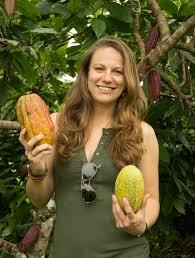

Keep this story going! Share below!
By openly publishing the prices paid to farmers, exporters and chocolate makers, the company brings accountability to the supply chain. In doing so, the company is proving that ethical business can be both transparent and profitable, all while contributing to the UN Sustainable Development Goals. Their efforts support SDG 1 of No Poverty by increasing cacao farmer incomes through fair and transparent payments and SDG 10 of Reduced Inequalities by ensuring farmers receive a higher share of the value as the industry grows. Operating from Colorado and Amsterdam, Uncommon Cacao builds long-term relationships with smallholder farmers to foster social and economic equity.
The innovation at the heart of Uncommon Cacao Group is not simply the product of chocolate, but their model of transparent trade. Stone stated, “We’re the only international cacao trader that publishes the prices paid to farmers, exporters and chocolate makers.” She stated that their approach to ethical sourcing allows both consumers and chocolate makers to understand where their chocolate comes from. The innovation emerged from Emily Stone’s firsthand experience with the shortcomings of traditional fair-trade certification systems. Recognizing that millions of smallholder farming families continued to live below the poverty line and that issues like child labor and deforestation persisted, Stone sought a more accountable, sustainable and data-driven approach.
Stone shared that alongside her co-founders Alex Whitmore and Gabrielle Pop, they built a company that prioritized transparency, quality and farmer empowerment. This innovation is deeply tied to Uncommon Cacao’s mission and values. Stone explained, “Publishing prices, including our own margin, requires courage and accountability, but it also builds trust.” The company’s six guiding values; courage, interdependence, grit, passion, accountability and balance, reinforce the purpose behind this innovation.

The inspiration for Uncommon Cacao grew out of Emily Stone’s activism in environmental and social justice campaigns. At 25 years old, she was troubled by how disconnected consumers were from the farmers who grew their food, especially in the cacao industry where child labor, poverty and environmental degradation were widespread. Stone saw that certifications like “fair trade” were not solving systemic inequities. Despite consumers paying a premium for ethically labeled chocolate, farmers remained trapped in cycles of poverty. This realization became the foundation for Uncommon Cacao’s mission: to build a transparent and equitable cacao market that directly connects farmers and chocolate makers. She emphasized, “We wanted to humanize the value chain and show that transparency can change lives.”
This realization led to the creation of Maya Mountain Cacao in Belize. “It started with activism in social and environmental justice,” Stone said, “realizing we could create a business that actually worked for people and the planet.” The company’s early days were filled with risk, as they operated in developing regions, worked on overcoming cultural barriers and invested heavily in relationships with local farmers. The early years were filled with risk, experimentation and financial uncertainty. It took a decade before Uncommon Cacao became profitable, but the company’s mission kept the team motivated. Over time, Uncommon Cacao grew into a network connecting smallholder farmers across Latin America with craft chocolate makers around the world. Key milestones, such as the first metric ton of fermented cacao at Maya Mountain in Belize, and later recognition through international awards like Cacao of Excellence reinforced that Uncommon Cacao’s vision was both viable and impactful.
Uncommon Cacao has a significant impact on transforming the global cacao industry by promoting transparency and fairness in trade practices. Stone explained that “consumers are used to paying very little for chocolate,” which has created “a disconnect between people and the distant farmers who make this product possible.” They focus on building authentic relationships with cacao farmers, especially supporting over 2,349 female producers in 2024. Their commitment to systemic change involves sharing detailed transparency reports and encouraging the community to learn about their efforts. This approach helps create a more equitable and sustainable supply chain, empowering farmers and fostering long-term positive change for both people and the environment. Their work demonstrates how a business can drive social and environmental progress while growing responsibly.
Uncommon Cacao’s innovation is driven by a dedicated team motivated by a clear mission to address societal and environmental challenges. Their efforts have contributed to the company's growth and have created long-term benefits for communities and the planet. By being the first company to publish detailed prices paid to farmers, exporters, and chocolate makers, they promote fair compensation and help reduce poverty among smallholder farmers. They acknowledge the impacts of climate change on cacao production, which threaten long-term sustainability, and emphasize the importance of fair pricing to ensure farmers can adapt and thrive despite these challenges. Their work aligns with global goals such as SDG 1 (No Poverty) and SDG 10 (Reduced Inequalities), fostering economic stability and environmental health for future generations. Overall, their impact extends beyond business success, inspiring others to adopt more ethical and transparent practices in the industry.
Uncommon Cacao benefits the business by establishing itself as a leader in transparency and ethical sourcing within the cacao industry. By openly sharing detailed information about their trade practices, including the prices paid to farmers and supply chain details, they build trust with consumers and partners who value social responsibility. This transparency not only differentiates them from competitors but also attracts a growing market of conscious consumers who prioritize ethically sourced products. Their focus on authentic relationships helps ensure a reliable and sustainable supply chain, which supports consistent product quality and long-term business growth.
Their commitment to systemic change and education enhances their reputation and brand loyalty. Their efforts to promote fair trade practices and support community development align with global sustainability goals, making them attractive to investors and partners interested in responsible business practices. By fostering a positive impact on communities and the environment, they create a strong brand identity that appeals to a broader customer base, ultimately driving sales and expanding their market presence in the specialty cacao and chocolate industry.
Environmentally, Uncommon Cacao delivers significant environmental benefits by anchoring its sourcing within agroforestry and forest-friendly cacao cultivation systems. “Farmers already feel the effects of climate change every day,” she said, noting that extreme heat and deforestation have detrimental effects on the production of cacao. For example, their transparency data show that 60% of the land in their producer network is organically certified, 60% of cacao is intercropped and the farms average roughly 44% shade cover, which are all practices associated with healthier soil, better biodiversity and carbon capture. Additionally, they partner with forest-conservation oriented producer groups and support associations in Guatemala cultivating cacao under agroforestry buffers to protect sensitive ecosystems from palm-oil or other extractive agricultural expansion.
Uncommon Cacao’s work directly uplifts cacao-farming communities by increasing income, reducing exploitation and promoting economic equality. Its commitment to sustainability encourages environmentally friendly farming and strengthens resilience against climate change. Beyond the farms, the company educates consumers to value chocolate not simply as a treat but as a product rooted in human labor, cultural heritage and environmental stewardship.They purchase beans directly from more than 10,000 farmers across 15+ countries, disclose farm-gate pricing publicly under their “transparent trade” model, pay significantly above typical commodity market rates and build long-term partnerships with farmers, which increases incomes, improves working conditions and enables communities to reinvest in their farms and livelihoods.
Get stories of positive business innovations from around the world delivered right to your inbox.
Emily Stone, Founder


Uncommon Cacao is a Certified B Corporation leading systemic change in the global cacao industry. Unlike traditional fair-trade systems, the company publicly shares every price paid throughout its cacao supply chain from farmers to chocolate makers.